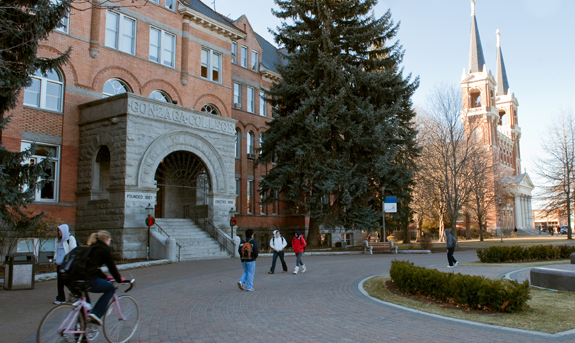

A professor at Gonzaga University is disputing a claim by the administration regarding the status of the Knights of Columbus chapter on the school’s Spokane, Washington campus.
Last month, GU denied a Knights of Columbus group official club status on the grounds that requiring members be Catholic violated the school’s non-discrimination policy; Gonzaga issued a statement in which it said President Thayne McCulloh will be reviewing the Student Life division’s decision. The statement also claimed, “The Knights of Columbus College Council (#12583) is already present within the student body and receives support from the administration.”
That assertion has been disputed by Dr. Eric Cunningham, a history professor at GU, the assistant director of the school’s Catholic Studies Program, and the faculty member advising the KofC group. Cunningham told Catholic News Agency that GU is not, in fact, supporting the Knights in any way.
“If they’ve been denied club status, the only way they exist here is that the members of the Knights of Columbus council are enrolled here,” Cunningham stated. …
Cunningham has noticed that the council is “listed in our advertising materials,” specifically in a brochure “that goes out to parents” showing the group listed as a student organization.
“So in other words, we’re kind of using them as recruiting tool, telling parents that we have a Knights of Columbus council that their sons can certainly join if they come here.” …
Cunningham understands that roughly $1000 of the council’s funds had been frozen by the Gonzaga student body association, and he said that “what I hear from the membership, is that hasn’t been returned yet.”
“Not only are they not being supported, they haven’t had their money returned to them. There’s no official support.”
Cunningham has been associated with the council since 2006, and noted that he has made available to them the Catholic studies house, after “they were asked by the director of university ministry to stop meeting there.”
“They don’t have a chapter house, they were actually asked to stop meeting in the house they had been using. So I’d really love to know what Gonzaga is defining as support for the campus council.”
Last week, Dr. Francis Beckwith wrote about the GU/KofC controversy at The Catholic Thing, describing the case a classic example of what he calls “the passive-aggressive tyranny tick”:
As with any college campus, Gonzaga includes among its students serious religious believers, including Christians, Jews, and Muslims. Because they take their faith seriously – that is, they believe that their faith is not only true but its communities and practices essential to moral and spiritual formation – they desire fellowship with others within their tradition and strive to become better examples of authentic faith.
Because of the nature of the religious faith embraced by these students – and the differences between men and women that most of these faith traditions rightfully acknowledge and celebrate – certain types of spiritual and moral formation simply cannot be accomplished in settings that are ecumenical and/or in mixed company.
By not offering these students an opportunity to organize groups that accomplish these ends, Gonzaga effectively marginalizes these students, suggesting to the wider public that their religious interests are illegitimate, not worthy of being part of the Gonzaga community and its conversation about the good, the true, and the beautiful.
Consequently, although one of its vice presidents states that the university desires “to create and maintain an environment in which none are excluded,” it in fact excludes, and it does so by implying that those who are excluded harbor antipathy toward social justice and equity.
Read the whole piece here.
Related: “Professor: Will Gonzaga also consider removing the Society of Jesus from campus?”
If you value the news and views Catholic World Report provides, please consider donating to support our efforts. Your contribution will help us continue to make CWR available to all readers worldwide for free, without a subscription. Thank you for your generosity!
Click here for more information on donating to CWR. Click here to sign up for our newsletter.


